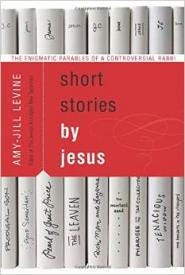Lent 4C: Nearly unimaginable
Joshua 5:9-12, 2 Corinthians 5:16-21, Luke 15:1-3, 11b-32

All of us have had the experience of thinking twice about what we’re going to say to someone we don’t know really -- not well enough to know their politics. If we say the wrong thing we could suddenly become "one of them," or they could become "one of them" to us, and we don't want that to happen. We don’t want the factionalism, the anger, the mistrust of the political scene today to ruin this moment, this friendship.
The parable in Luke is about two brothers who have grown to dislike and distrust one another. Amy-Jill Levine writes about this parable in Short Stories by Jesus, She says that this parable is not about the Prodigal Son’s “repentance” or the father’s extravagant forgiveness. It is about two brothers who dislike and distrust one another. (It's a great book. She talks about this parable in Chapter 1: "Lost Sheep, Lost Coin, Lost Son.")
Most of us suspect that the father’s explanation (“all that is mine is yours”) is hopelessly naïve. The Prodigal has returned to beg, not to repent, and we know that until the Prodigal is stopped, he will drain the father’s estate until there is nothing left for anyone. As for the Elder brother, we can't see what he has done wrong, so nobody is repenting. It's a standoff.
Arguably, the parable asks us this question: Do we really need to be reconciled to someone whose values are diametrically opposed to our own, and whose actions and behavior threatens our well-being? Do those of us who live in the hen house have to be reconciled to the fox?
One answer is, "no" -- we should not be reconciled. Foxes and prodigals are dangerous and we should protect ourselves. But another answer is, maybe we should try. Maybe human society is capable of more than "survival of the fittest." Maybe we are called to find a way to make peace with our enemies.
Jesus goes past "maybe" to say we absolutely should find a way to make peace with our enemies. Neither this parable nor his life story minimizes how difficult that might be. Like the brothers, our enemies may not be repentant. Like the brothers, our enemies may cling to values which are anathema to us. Like the brothers, we may have to see our carelessness or our privilege through others' eyes.
Paul’s letter to the Corinthians agrees: such standoff reconciliations are so difficult that we cannot do it in our present state. We will need to be a “new creation.” Think Easter and new life. That’s big: nearly unimaginable. Forty days is not enough time for anyone get there; only enough time to gather the willingness to try.

